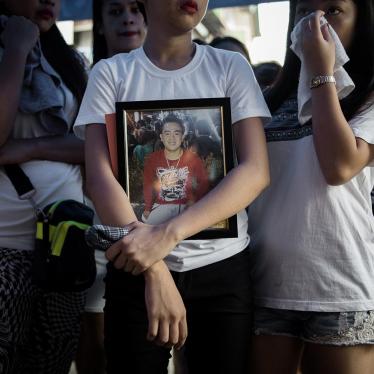(Beirut) – Qatari labor reforms enacted in 2015 failed to provide meaningful protection to low-paid migrant workers and left them acutely vulnerable to trafficking and forced labor, Human Rights Watch said today in its World Report 2016.
Qatar is building stadiums and developing infrastructure in preparation to host the 2022 FIFA World Cup, but despite several years of sustained criticism over its mistreatment of migrant workers, reforms announced in October 2015 have not addressed the most problematic features of the kafala (sponsorship) system.
“Qatar’s inadequate labor law reforms undermined its progressive ambitions,” said Sarah Leah Whitson, Middle East director. “The Qatari government should understand that protecting the rights of migrant construction workers is a necessary part of hosting a 21st century football tournament.”
In the 659-page World Report 2016, its 26th edition, Human Rights Watch reviews human rights practices in more than 90 countries. In his introductory essay, Executive Director Kenneth Roth writes that the spread of terrorist attacks beyond the Middle East and the huge flows of refugees spawned by repression and conflict led many governments to curtail rights in misguided efforts to protect their security. At the same time, authoritarian governments throughout the world, fearful of peaceful dissent that is often magnified by social media, embarked on the most intense crackdown on independent groups in recent times.
In October, Qatar’s Emir, Sheikh Tamim bin Hamad Al-Thani, issued Law No. 21 of 2015, regulating the entry and exit of repatriates and their residency. The new sponsorship law refers to “recruiters” instead of “sponsors” but leaves the fundamentally exploitative characteristics of the kafala system in place. Workers must still obtain a“No Objection Certificate” from their employer if they want to transfer legally to another employer. Workers also must still obtain exit permits from their employers to leave Qatar. The new law provides a grievance committee for cases in which sponsors refuse to grant exit visas, but the arbitrary restriction on a worker’s right to leave the country remains in place.
In February, Sheikh Tamim approved an amendment to Qatar’s labor law that introduced a wage payment protection system. The new system requires employers to pay workers’ salaries directly into their bank accounts.
But the reforms to the labor law in 2015 continued to exclude domestic workers from the law’s limited protections and leave them vulnerable to exploitation and physical and sexual abuse. A law on domestic workers remained in draft form and had not been made public, at the time of writing.
|
News Release
Qatar: Failing on Crucial Labor Reforms
Inadequate Protections for Migrant, Domestic Workers
Your tax deductible gift can help stop human rights violations and save lives around the world.
Region / Country
Most Viewed
-
December 15, 2024
Sudan: Fighters Rape Women and Girls, Hold Sex Slaves

-
March 12, 2025
Philippines: Duterte Arrested on ICC Warrant

-
March 2, 2017
“License to Kill”

-
August 29, 2024
South Korea’s Digital Sex Crime Deepfake Crisis

-




